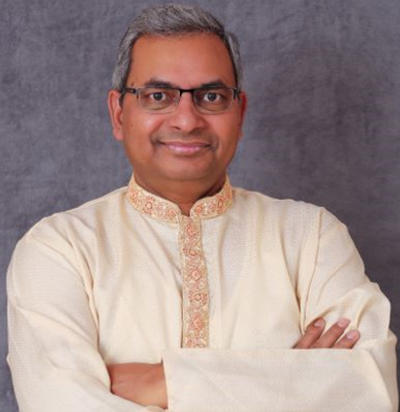| Posted January 5, 2021 | By Vinod John, PhD | Categorized under Missiology and Theory |
"Christ is my ‘ishta'[God], he has never left me, I will never leave him, but I would not have joined the Christian community.
I would have lived with my people and my community and been a witness to them."
Yisu Das Tiwari (1911-1997), a follower of Christ from a Brahmin family of North India, made the preceding striking statement to his son, Ravi Tiwari. I find senior Tiwari's admission effortlessly intersecting with the narrative of thousands of Hindu devotees of Christ in India today. Why did Tiwari regret joining the Christian community? What could be the causes behind such rumination?
These are the questions that prompted me to investigate the pertinent issue of religious believing in Jesus Christ vis-à-vis social belonging of the believers. The relationship of believing in Christ and belonging to the institutional church or Christian community is as old as the Christian faith in India and the issue reemerges today in the form of a missiological dilemma: Many caste-Hindus claim to believe in Christ but remain outside the institutional church and some decide to remain unbaptized.
In my ethnographic case study in India, Believing Without Belonging? Religious Beliefs and Social Belonging of Hindu Devotees of Christ (2020), I argue that this response to the gospel needs to be viewed from the theoretical perspective of World Christianity in general and Christianity's enduring encounter with Hinduism and Indian culture in particular.
I am thrilled this study is finally seeing the light of day published under the ASM Monograph Series (48). Dr. Darrel Whiteman, in his endorsement of the book, writes, "In this carefully researched and well documented study, John brilliantly tackles the issues of baptism, identity, and ecclesiology and boldly concludes that these Hindu devotees of Christ are neither anonymous Christians nor secret Christians, but rather represent an authentic expression of World Christianities."
Christian mission not only transforms the cultures it reaches, but the new inculturation of Christianity also is transformed and particularized in that process. People do not merely become adherents of Christ, but that faith becomes localized in its theology, ecclesiology, and missiology. History is replete with such models of the gospel's transformative nature through contextual hermeneutics of the Bible. My book recognizes and promotes what Lamin Sanneh terms the "translatability"1 of faith, which represents the intrinsic characteristic of the gospel it preaches because the gospel will "invigorate and transform"2 the cultures and the peoples that accept it. Through the inclusion of people's history, culture, oral traditions, and their devotional piety in each context as valid sources of contextual hermeneutics, World Christianity as a theoretical perspective has widened the scope of sources for doing theology and practice of missions. These sources have not only been accepted as valid as the written scriptural texts for doing theology today, but they have also molded the nature of our faith and its mission, especially in the Majority World.
This process of the transformation of faith is no different in India where the gospel's interaction with various cultures and caste groups has produced distinct types of Christianities. For instance, the Syrian Orthodox Christianity of Kerala (South India) and the formation of a distinct community, because of Christians' migration from Syria and subsequent mingling with the local converts, are unequalled anywhere else in India. In northern India, during the colonial period, the ensuing Christianity was typically a replica of prevalent European Christianity. But then, the acceptance of the gospel by various aboriginal and Dalit cultures shaped distinctly indigenous forms of Christianity, with some Western structures intact. Furthermore, the dynamic interaction of the gospel with the Hindu tradition also culminated in the emergence of alternate forms of Christianity, quite dissimilar from its existing expressions in North India. One type of this emergent expression of indigenous Christianity among caste Hindus appears to exhibit the trait of believing in Jesus Christ but belonging differently to the church.
In this distinct form, some caste Hindus shift their religious allegiance to Jesus Christ but do not become formal members of an institutional church. Instead, they continue living in their communities of birth. Such a response to the gospel aptly fits as a case in point in World Christianity that "seeks to foster the study and practice of both local and trans-local ways of knowing and doing."3
The study highlights the emergent Hindu response to the gospel as a contemporary case in the transformation of Christian faith by the recipients in a multifaith context. The legitimacy, authenticity, and missiological significance of the movement of Hindu devotees of Christ are attested as an indigenous expression of World Christianity. They are negotiating a distinctive way of belonging to Christ and the church. Their beliefs and living out of their faith illustrate what it signifies to be a Hindu and yet profess the lordship of Jesus Christ today. This atypical belonging to Christ and the church challenges the notion that insists on identifying oneself as a "Christian" and joining the existing Christian community as the normative ways of being a follower of Christ.
1 Sanneh, Lamin, Translating the Message: The Missionary Impact on Culture, 2nd rev. ed. (Maryknoll: Orbis, 2009), 11, 211-37.
2 Sanneh, Lamin, Disciples of All Nations: Pillars of World Christianity (New York: Oxford University Press, 2008), 56.
3 Dale Irvin, "World Christianity: An Introduction," Journal of World Christianity (Online) 1 (2008), 1-26.
By Vinod John, PhD

Dr. John is an adjunct faculty at Taylor Seminary (Edmonton, Canada) and Sioux Falls Seminary (USA) besides pastoring a multicultural church and leading an indigenous mission agency.
Email: [email protected]
Website: https://vinodjohn.com/
Facebook: https://www.facebook.com/DrVinodJohn/
Twitter: https://twitter.com/johnvinod